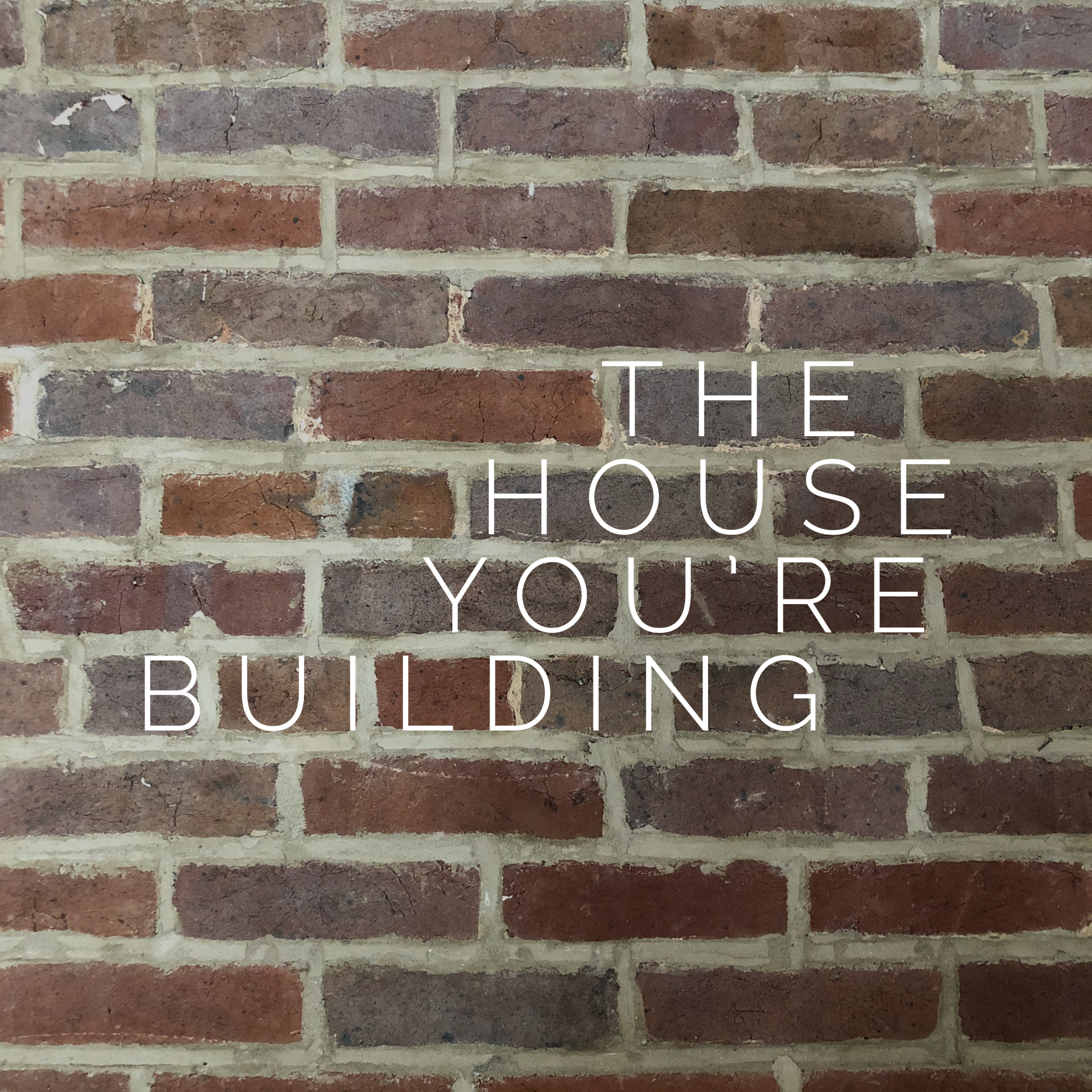The House You're Building
The following is the sermon that I preached yesterday at Woodmont Christian Church on Matthew 7:24-29. Attached below is the manuscript and video of our socially-distanced, masks required sanctuary service in which I wear a robe and land a Led Zeppelin joke much better than I did in the pre-recorded online service.
Our family recently moved into a new house. Let me amend that. Our family recently moved into a house that is new to us. The house itself is anything but new; it was built in 1899. Again, it was built not in this century, not in the last century, but the century before that. We moved in right before Halloween. And now that we know it’s not deeply haunted, I am really in awe of the place. It’s like living in a history book. We know that the house was in a fire at one point and that it was rebuilt. We think our bedroom used to be the kitchen and that the kitchen used to be a screened in porch; you can see the exterior brick in there. The floors creak with century’s worth of character as you make your way across every room.
Just think of all that house has seen. It is 121 years old! 1899 was only a few decades after the Civil War. It was nine years before the Model T came out, two and a half decades before indoor electricity was common in homes. Mark Twain was still alive and none of us here were close to being around. The house has been around for world wars and us putting a man on the moon. In that house—built during the presidency of William McKinley—there is now electricity and running water, we drive from it without a second thought, and have video calls with relatives who live hundreds of miles away. It’s kind of mind boggling. I mean, how does something stand the test of time and a literal trial by fire like that? How do you build something to last?
That is the question that is at the heart of our text today. How do you build a life that is going to last? An existence that will stand the tests of time and trials by fire; that will weather life’s storms? This is a familiar passage. If you’ve ever been in a children’s Sunday school class or have gone to Vacation Bible School, you have probably sung the song about the wise man who built his upon the rock. Jesus tells us a story of that astute architect and his less wise counterpart. Both of them built their houses.
On the surface, Jesus doesn’t indicate any difference between the two dwellings. The sole exception is that one house was built upon rock and the other upon sand. For all we know, the two could have been identical beyond that variation. The house on the sand could have been more extravagant. Jesus doesn’t say. That is not really a concern for him. After all, God does not look at the external like we do but at what is inside or—in this case—what’s underneath.
The story continues. A great storm rolled in. The winds howled and torrential rains beat down on both houses until the flood waters rose. The house on the rock withstood the devastating storm, but the house on the sand collapsed. And Jesus makes sure to point out that house’s destruction was a tremendous and epic fall. The idea that we will face storms in life should not be a new one to us. Indeed you would have to have your head in the sand if you did not realize that there will be difficulties in this world that will test each of us mightily. So again, the question is how does one build something that will withstand the trials, tests, and storms that life throws at us?
Fortunately for us, Jesus is not evasive in his answer. He is quite clear: “Everyone who hears these words of mine and acts on them will be like a wise man who built his house on rock.” Re-reading this passage this week, that very first verse leapt off the page at me. Because from those childhood songs, I have always understood this to be a story about trusting Jesus, of having the right faith or belief. The wise man built his house on the rock—he believed in Jesus—and when the rains came down and the floods came up, the house on the rock stood firm. But this is not a story about believing in Jesus. Well, it is, but not in the way that it is often taught.
This story is a precursor to James saying that faith without works is dead. You can say you believe something all the live long day, but it’s not until you act on it that it becomes something real. I can believe I could play in the NBA, but that means squat until I exhibit some actual NBA-level skills. I can say I love my wife or my children, but that love is purely theoretical until it is exhibited with action. I can believe I’m a good person, but if my actions do not support that belief then I am just deceiving myself. Jesus says the one who builds a house that will last is the one who hears his words and acts on them; specifically the words that Jesus teaches in the Sermon on the Mount.
This grabbed ahold of me because the Sermon on the Mount is often viewed as advanced level Christianity. If we’re going to extend the house metaphor: for Christians, living out the Sermon on the Mount is considered the dream home that you one day hope to live in when you have the time and means to build it. The things Jesus preaches in this sermon are difficult: fleeing from anger and lust, turning the other cheek, loving enemies, not making a spectacle of your good deeds, serving God rather than money, trusting God in all circumstances, refraining from judging others, living by the Golden Rule when others will not. The teachings found within Matthew 5-7 are seen as a tall order. To such an extent, that Christians have been trying to figure out ways to finagle their way out of the ethic preached here. The theologian Clarence Bauman once wrote:
It is commonly assumed that Jesus’ ethic was too high to be woven into the fabric of life in this world, that his teaching was too lofty for ordinary people in usual circumstances, and that his demands are therefore intended essentially for the original disciples transfigured by the divine aura of their Master, for metamorphosed believers elevated into an otherworldly existence, and possibly for beatified monks reposing in celestial bliss on holy mountains. (Bauman, Sermon on the Mount: The Modern Quest for Its Meaning, 409)
But that’s just not the case if we are going to take Jesus and this story seriously. He tells us that if we want our lives to withstand the test of time and all else then we need to act on this challenging sermon he has taught his followers. To do otherwise, as Ben Witherington puts it, is a failure of nerve. For the Christian, the Sermon on the Mount is not the maybe one-day-in-the-future dream home, it’s the starter house. Heck, it’s the foundation for the starter house and we build from there. These words that Jesus preach are not something that we can opt out of if we want to follow him.
So how do you and I—regular, everyday flawed people—live out such a high calling that is normally assumed to be for monks and saints? Remember a few minutes back when I said that this story was not about trusting Jesus in the normal way it is taught? This is where we come back to that. Jesus repeatedly asked his followers to do difficult things. When we are in church or when we live in a society where Christianity is considered the religious default, we forget about that. Yet time and time again, the call to be a disciple of Jesus is a challenge.
Later on in the Gospel of Matthew, there is this scene in which a rich young man declares he wants to follow Jesus. The guy says that he has done everything perfectly—which is suspect but we’ll give him the benefit of the doubt—and Jesus tells him that if he really wants to be perfect then he needs to sell everything he has and give it to the poor. The rich young man walks away brokenhearted, because he can’t bring himself to do that. It’s too tall a task. Jesus turns to his disciples and says the famous saying that it is easier for a camel to go through the eye of a needle than a wealthy person to enter the kingdom of God. And the disciples are just flabbergasted. “Then who on earth can be saved, Jesus?” And in Matthew 19:26, Jesus replies, “For mortals it is impossible, but for God all things are possible.”
To hear the words that Jesus teaches in the Sermon on the Mount and to act on them seems like a colossal challenge, but with God all things are possible. That’s why Jesus talks constantly about trusting God in these verses. He promises that God cares for us. God is with us, which is good because we are not going to get it perfect. As we try to build our house on the rock, we will smash our fingers with hammers more times than we would want to admit. The windows might let in a bit of a draft. And the floor is definitely going to creak and groan as we walk across it. Our houses are going to be imperfect. That is simply part of living this life. We are going to mess up and thankfully there is grace there to cover our shortcomings. In this sermon, Jesus instructs to pray that God forgive us our debts, trespasses, failings. He knows we’ll mess up. Yet God will be with us despite those construction mishaps.
Even as God is with us, we still have to have agency in all of this. God won’t do it for us. My two sons have been playing this Zelda game for a few months. Sometimes the game gets too difficult, so they hand me the controller and ask if I do it for them. And I try really hard not to take over because they need to learn how to solve the puzzle or have the patience to defeat the monster. I will guide them and I will help them, but they need to be the ones to play the game.
God will guide us, help us, and grant us strength, but we have to take the action. We must proactively be lights in the world. We must make every effort to not be consumed by anger. We have to be intentional about loving our enemies. We have to make the choice each day to trust the God with whom all things are possible. It won’t happen by accident or if it’s some sort of side project. We’ve got to build this house. With our sweat, our time, our effort, our heart, soul, mind, and strength.
It is good that God will be with us because Jesus promises that there are going to be rains and winds that beat upon our lives that will bring shattered windows, hail-damaged roofs, and flooding in the basement. There will be loss and pain, broken relationships, disease and death. We will be hurt and have to repair and pick up pieces. Yet Jesus promises us that throughout it all—no matter the damage—the house will ultimately stand firm. I admit, to accept that firm foundation is a leap of faith. All I can give you is my testimony which rests on the testimony of others before me, but I think the leap—the building on the teachings of Jesus and trust in God—is worth it.
I have been sitting with this passage this week and wondering how a life can withstand those tests over and over again. And I keep running up against the idea that we are temporal. Our time here is limited. So what then becomes of the house we build by faithfully following Jesus? Obviously, you can take the track that because we as Christians believe in a life beyond this earth then your house is never destroyed. That when Jesus says the house will stand, he is talking about our soul that will live on. And I believe that. Yet I wonder if what he is talking about can also mean something that will outlast us here. I don’t know if it’s because we celebrated All Saints Day a couple of weeks ago, but I keep coming back to what this house metaphor looks like when we’re gone.
My family lives in a house that is 121 years old. The person who built it and laid its foundation left this mortal coil quite a long time ago. Yet the fruit of their labor still provides shelter. It still is a home in which we live and eat and sleep and laugh and cry and pray. It’s kind of remarkable that it has withstood the test of time and everything that life has thrown its way. A well-built house will stand for an awfully long time and I’m coming to realize that people who follow these words of Jesus will too.
We have a few students in our youth group who have lost parents along the way. That is a grief that I cannot even begin to fathom; a storm whose clouds linger for a long time. Yet one of the most amazing things that I have witnessed is the way in which I see the lives of those loved ones continue to live on in their kids. It is very obvious that their parents—both those who are still here and those who are not—built their lives upon the rock. I see it in the lives these students are building with each brick of foundation that is laid with love and compassion. I see it in how they keep standing in the midst of life’s storms. I see it in how they reach out to others who are going through their own trials. The house still stands.
We’re coming up on Thanksgiving, which is a holiday that I closely associate with my Grandma who passed away a few years ago. I can tell you honestly that I probably wouldn’t be speaking to you today without her. Not just in how she and my Granddad raised my mom, but in how she modeled following Jesus to me. She was a light in the world. She trusted God. She was a genius of hospitality who opened her home up to anyone and everyone. She showed me what it meant to love God with your heart, soul, mind, and strength. She never made a show of praying but I knew she prayed fervently for me along with the rest of her family. She built her house upon the rock as best she could with God’s help. And she passed that along to her children and grandchildren and I pass it along to my children and my youth and to you. Sharon Williams’ house still stands just as real as I am before you. The house each of us build is not just for us. It is for our neighbor, our loved ones, and perhaps some unsuspecting stranger we will never know this side of heaven.
So do you want to build a house that lasts like that? A house that will stand the test of time and will be a haven that creates space for you, those around you, and those after you to a life full of justice, mercy, and walking humbly with God? If so, listen to these words from Christ’s Sermon on the Mount, take them seriously, and act on them. They are not just a blueprint for the saints and the exceptionally holy. They are for all who wish to follow Jesus. We will not get it perfect. Our houses may be crooked and drafty, but they will always stand because with God all things are possible.
So let’s build our houses and be people who are lights in the world, who are not consumed by anger or lust, who turn the other cheek, who love their enemies and pray for those who do them harm. We can be people who do not flaunt our good deeds, who fervently seek God in prayer, who serve God rather than money or anything else, who fill our lives with goodness, who trust, who ask, who seek, who knock, who treat others as we would want to be treated. Jesus said, “Everyone who hears these words of mine and acts on them will be like a wise man who built his house on rock. The rain fell, the floods came, and the winds beat on that house, but it did not fall.”






